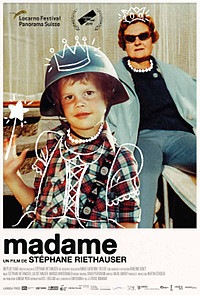| SHADOWS ON THE WALL | REVIEWS | NEWS | FESTIVAL | AWARDS | Q&A | ABOUT | TALKBACK | |||||||||||||
 Shadows off the beaten path Shadows off the beaten pathIndies, foreign, docs and shorts...
On this page:
AFRICAN APOCALYPSE |
BOYS STATE |
MADAME
| |||||||||||||
| See also: SHADOWS FILM FESTIVAL | Last update 1.Nov.20 | |||||||||||||
|
African Apocalypse Review by Rich Cline | 
| |||||||||||||
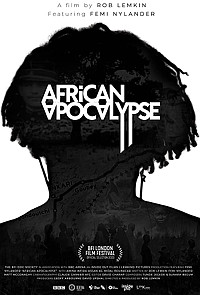 dir Rob Lemkin scr Rob Lemkin, Femi Nylander prd Rob Lemkin, Mark Bell, Geoff Arbourne, David Upshal with Femi Nylander, Amina Weira, Assan Ag Midal Boubacar, Chaibou Toune, Techi Marafa, Sabo Same, Abdou Haruna, Omar Basheer, Amadou Sadaou voices Toby Stephens, Pierre Mignard, Stephan Cornicard, Philippe Smolikowski release UK Oct.20 lff 20/UK BFI 1h32  Now streaming...
| 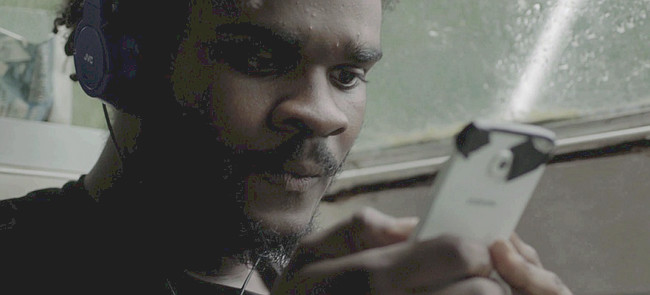 Activist Femi Nylander delves into his Nigerian heritage, exploring the real-life inspiration for a literary icon while learning history that isn't taught in school. The focus is on the route taken by the English and French as they conquered Africa's interior village by village. It's a fascinating travelog tracing a line from the present into the past. And it adds firsthand accounts to events mainly known only through fiction. African colonialism was epitomised in Joseph Conrad's novel Heart of Darkness (which inspired Coppola's Apocalypse Now) and its renegade mythical figure Colonel Kurtz. So Femi embarks on a quest to find who this man really was, a product of European culture like Britain's Cecil Rhodes or France's Paul Voulet. In Niger, he joins Amina and Assan to follow Voulet's 1,000-kilometre trek to Lake Chad, hearing oral histories of horrific events from the 1890s that remain in the cultural memory. They also see ruins of military massacres, and Voulet's story takes a turn that echoes Conrad's fiction. In Oxford, Nylander unearths documentation of Africa's 19th century colonial history, including film and photographs of mutilation as punishment, sport and control. In Niger, he stops at a village museum, playing an audiotape of a 98-year-old woman remembering when Voulet, whom she calls "a son of Europe", captured and tortured her. Meanwhile, the soundtrack features spoken snippets from Heart of Darkness, as well as Voulet's letters about other memoirs. This archival material sits alongside present-day clips of terrorist groups like Boko Harem, which operate in the same region. Nylander is curious and sensitive, even if the film sometimes overdramatises its themes. But the people he meets offer powerful accounts handed down through generations, so travelling this route gives him several deeply personal jolts. It's clear that he's struggling to reconcile his European life with his African ancestry, so the indigenous spiritism and animism hold a deep fascination for him. And he feels revulsion at stories of what's still happening here, poisoning the land. Locals admit they can never forgive France for demolishing their culture. "They found us rich and left us poor," one observes. And their side of history has been ignored, something that rightly disgusts Nylander. Then at one point, Amina and Assan comment that he seems oddly unmoved by these awful stories, so he has to explain his English reserve. They also tell him he needs to acknowledge what's happening here now, because Europe's legacy must be confronted in order to bring hope for the future.
| | |||||||||||
|
Boys State Review by Rich Cline | 
| |||||||||||||
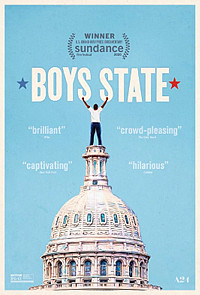 dir-prd Amanda McBaine, Jesse Moss with Ben Feinstein, Steven Garza, Rene Otero, Robert MacDougall release US 14.Aug.20, UK 30.Oct.20 20/US 1h49 SUNDANCE FILM FEST  Now streaming... |
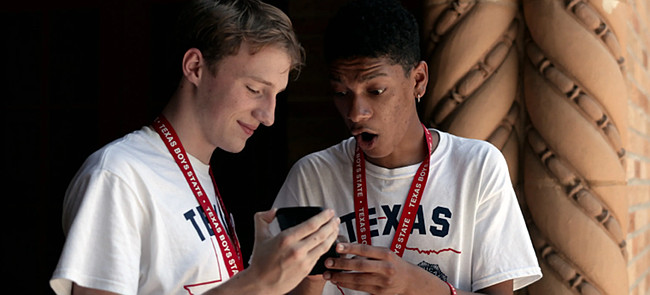 An expertly assembled fly-on-the-wall doc, this film follows teen boys through an exercise in which they create their own government. With girls in their own programme, there's an overload of adolescent testosterone, as these young men show lots of confidence but very little experience. And the film beautifully taps into the need for unity and cooperation in politics, especially since both are in short supply in American society. In a week-long programme run since 1935, young men and women stage an experiment in democracy and civil discourse. This doc centres on a group of politically engaged Texan teens who join with thousands of others in the capital Austin. Their partisan beliefs begin to emerge on the bus ride: one prominently clutches his Bible, while Steven thinks he might be the only non-conservative in the group. The boys are randomly assigned to two fictional political parties, for which they develop a platform before running campaigns for various offices, ultimately electing a governor. As the filmmakers follow the two parties, it's fascinating to watch leaders emerge immediately, usually due to their force of personality rather than any deeply held convictions (Steven is one of the exceptions). Several guys rouse the crowd around cliches of powerful masculinity. All have already learned to never answer a question directly or offer a personal opinion. It's fascinating to see what drives them to seek positions of leadership. And there's even a talent show to offer some non-political texture. The cameras hone in on four guys who rise to the top of the pile. Ben says he'll stand for freedom, regardless of his party's policies, and he becomes the Federalist party chair. Filled with attitude, Rene takes a sassy approach as Nationalist party chair. Robert simply rides on how "great and cool I am", appealing to the dudes with tough-guy cheerleading. The son of migrants, Steven shows the most sensitivity, quietly watching everyone before speaking from the heart. As his main rival, even Robert recognises that he's the better candidate. It's terrifying how easy it is to get these crowds braying in favour of nonsensical jingoistic slogans. They also thoughtlessly seize on the same issues adults debate around them; seeing a huge sea of teen boys chanting against abortion is even more disturbing then their cheers for assault rifles. But they're actually hiding their true beliefs to play the game, appealing to mob rule. Seeing this experiment teach them why politicians lie to get into office is seriously unnerving.
| ||||||||||||
|
Madame Review by Rich Cline | 
 Now streaming...
| 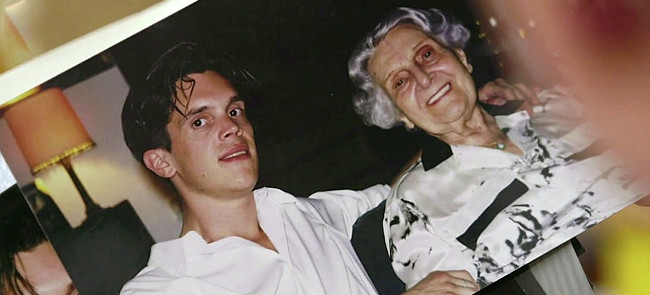 Using an archive of home movies, Swiss filmmaker Stephane Reithauser takes the audience on a meaningful trip through his relationship with his larger-than-life grandmother. It's a bracingly original exploration of how gender roles force people into double lives, written as a nostalgic message to a woman who, through her unflinching honesty, encouraged him to be himself. The kaleidoscopic approach and lively characters make it both engaging and powerfully important. It's been 15 years since his grandmother Caroline died, but filmmaker Stephane can still hear her inimitable running commentary on his life, comically making fun of him. Using extensive video clips, he explores their relationship over the years. He calls her his muse and protector, and jokes that she was the true leader of the family, even if a woman wasn't allowed to be successful at business. Stephane also talks about his own double life, living in the closet and pretending to be the man everyone wanted him to be. Stephane's father was a filmmaker, and his rich archive supplies both witty short dramas and beautiful footage of Stephane's childhood. Growing up with his parents as role models, he learns that men are intelligent, brave and seductive, and women are princesses. And a marriage is what he has to look forward to. After Caroline buys Stephane his first video camera, the footage becomes more specific and intimate, catching their singular connection even as he avoids telling her that he's gay. But then he also struggles to admit it to himself. And not telling her strains their relationship. The hilariously chatty Caroline dominates the film, especially in her 80s as she recounts lively stories from her life, including a harrowing anecdote about her parents pushing her into an unwanted marriage. "We were raped at the time," she admits, before describing being abandoned to deliver her child on her own. After her divorce, she was shunned. Meanwhile, Stephane's family and culture instil a sense of homophobia that begins to cause a disconnect within him as he discovers the actual world around him. This film is gorgeously edited together as Stephane traces his childhood, never flinching from more difficult moments and digging further into confrontations. The range of snapshots and footage is stunning in what it reveals along with his voiceover musings about expectations taught to him by everyone and everything. It's a strikingly personal exploration of how it feels to know that there's something different about you. And his grandmother's unconditional love and friendship that comes through loud and clear.
| 
See also: SHADOWS FILM FESTIVAL © 2020 by Rich Cline, Shadows
on the Wall
HOME | REVIEWS | NEWS | FESTIVAL | AWARDS
| Q&A | ABOUT | TALKBACK | | ||||||||||


